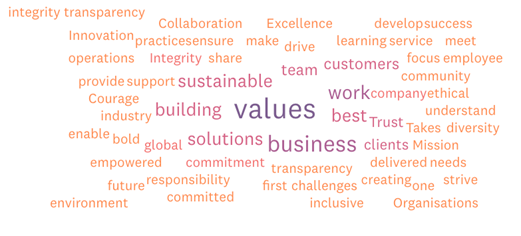Reading Between the Lines: what your Core Values could be saying about your company
The Value Statement, or Core Values of a company emblazoned across a Financial Statement or Sustainability Report can either support a powerful message of long-term fundamental beliefs and commitment, or project cringeworthy virtue-signalling, at best ignored by the target audience, or potentially damaging the brand rather than bolstering it.
What you say and how you say it is can have significant consequences.
When TDH sits down with a company to evaluate its ESG strategy we ask a number of questions (133 actually), enabling us to construct a comprehensive ESG profile. One question we ask is: What are the Core Values of your business? About 65% have worked on describing their Values to a greater or lesser extent, and the results tell us a lot about a company’s beliefs, culture, self-identification and how it wants to project itself to stakeholders.
What have we learned from this one simple question?
- Core Values are not a Vision or Aspiration: Although valuable in their own right, Aspirational Values are hope-based goals. The Core Values help you get there.
- Exploitation of FV can lead to KV: Filler Values are keywords (Inclusive, Ambitious, Leader, Global) with no obvious contextual impact. When deployed they can project a casualness or flippancy that may turn your Core Values into Killer Values.
- Simple is good: Core Values are a meticulously crafted summary of your most precious beliefs, honed into a memorable sentence. Lengthy self-proclamation undermines your credibility.
- If you are not ready, don’t write: Core Values are a product of reflection, and take time to formulate. Forced values may transmit indifference.
- Its never too early to be thinking about your values: even if you are not ready to commit to paper/website, start the process and gather feedback from your stakeholders.
- Core Values need collaboration and buy-in: Senior management must sign-off, but employees must buy-in or you risk accusations of purpose-washing.
- Built to last: Another reason to reflect carefully on the words you use – once committed you are living these beliefs for a very long time, demonstrating strong culture, steadfastness and reliability.
- Core values don’t always travel: Nothing fails quite like a cultural or linguistic faux pas. If you are planning to extend your values to overseas offices be mindful of cultural impact.
- Not just for large corporates: Over 60% of AIM listed SMEs and 65% of private companies assessed by TDH see the benefits of using Core Values as part of their corporate strategy.
- Uniqueness is over-rated: if you are in the same sector and serve similar markets it is not unusual to use similar Core Value content. How you live those values is what differentiates you from the pack.
To find out how 133 questions can help put ESG at the heat of your business contact The Disruption House or email info@thedisruptionhouse.com


